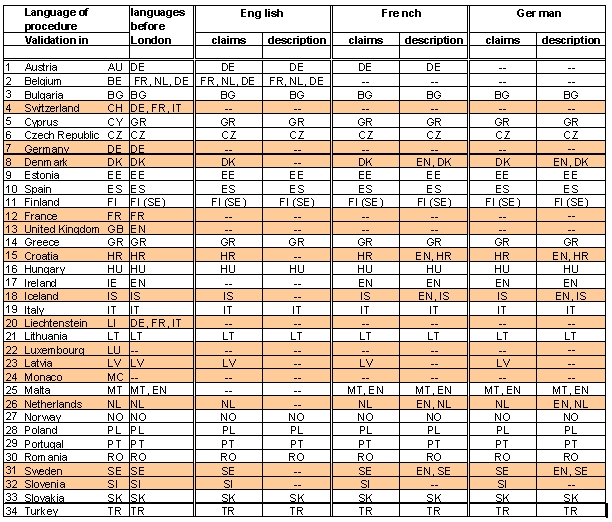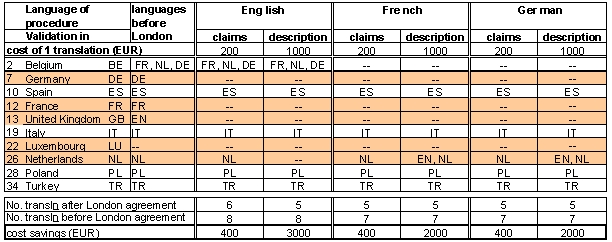




 |
European Patent: the London agreement enters into force this May 1st, 2008Par Marco Connor [Kirkpatrick]Jeudi 01.05.08 |
London Agreement
The London agreement enters into force this May 1st, 2008, aiming at reducing the costs related to translations for European patents granted as from May 1st for most of the signatory states. The states (1) which ratified the London agreement waived partly (2) or completely (3) the requirements for translations in one of their national languages to validate a granted European patent.
Table 1 summarises the translations still required to validate a European patent in the EPC-contracting states as a function of the language of the procedure (English, French, or German). The shaded backgrounds indicate the states which ratified the London agreement. To illustrate the savings generated by the entry into force of the London agreement an example is presented wherein a 16-page European patent is validated in a typical selection of ten states: BE, DE, ES, FR, GB, IT, LU, NL, PL, TR (underlined = ratified London Agreement). Assuming that the translation costs about 1000 EUR for the description and about 200 EUR for the claims, it can be seen in Table 2 that the patentee saves about 3400 EUR on translation costs with respect to before the London agreement if the language of the procedure is English, and about 2400 EUR if the language of the procedure is French or German. Note that this selection comprises five states only which ratified the London agreement, including Luxembourg which never required any translation even before the London agreement.
Table 1: translations required by EPC contracting states for the validation of an EP-patent
Table 2: translation cost savings for validations in a selection of ten states 
Belgium languages regime
Belgium has not ratified the London agreement yet, and it is not clear at this stage whether it will. As in the past, European patents may be validated in Belgium only upon filing of a translation in one of its “national languages.” (4) There has been some debate as to whether a European patent drafted in German or a German translation thereof could be validly filed with the Belgian patent office to validate it in Belgium. The debate concentrated on the use of the expression “official national languages” with respect to the provisional protection conferred by a European patent application defined in Art.3, §3 of the Belgian patent law of 08.07.1977; note that this expression has never been used with respect to validation of a European patent in Belgium. The Belgian intellectual property office is of the opinion that a European patent could be validated in Belgium by filing a German version thereof since German is a “national language” of Belgium (5). This view seems to be confirmed by the legislators who amended Art.3, §3 of the Belgian patent law of 08.07.1977, deleting the term “official” (cf. Art.2, §3 of the Belgian Bulletin of 04.09.2007, p.45943). Some, however, still wonder how a judge would answer the question of how can a patent be considered as valid in Belgium when drafted in a language spoken by less than 1% of the population (6).
It follows that a European patent drafted in French does not need to be translated to be validated in Belgium. Theoretically, as supported by the Belgian intellectual property office, the same should apply to a European patent drafted in German. But caution is required here, as the risk in case of litigation of seeing the validity of a Belgian patent drafted in German being challenged exists. Creating case law is never a comfortable experience. Finally, a European patent drafted in English can be validated in Belgium only upon filing of a translation of the entire specification in one of its ‘national languages”: French, Dutch, or German(?).
Conclusion
We know that patent protection in Europe is more expensive than in comparable markets like the US, Japan, or China, due to its national legislative partition in terms of patents. Observing that all direct neighbours (7) of Belgium have simplified their validation requirements by ratifying the London protocol, whilst Belgium is still debating on its languages regime, a patentee may be tempted to skip Belgium altogether when deciding where to validate its European patent in order to save the cost of the translation in French, Dutch, or German.
Innovation in Europe, however, cannot be fostered if there are gaps in the protection of technologies at the very heart of Europe, particularly in Belgium which, with its central geographical position, its important harbours and the seats of numerous major companies headquarters is of strategic importance in Europe for both goods transport and distribution, and business. To prevent this phenomenon to occur, some suggested that the Belgian patent office could reduce the amount of the annual fees for maintaining a patent in Belgium in order to compensate for the extra translation costs still required in Belgium. Alternatively —or additionally— the Belgian IP-firms could help promote the validations of patents in their country by substantially reducing their administrative fees, in particular those related to validations. This latter approach was adopted by KIRKPATRICK to reassure the foreign patentees during this period of uncertainty concerning the position of the Belgian government with respect to validations of European patents in Belgium.
Marco Connor, PhD
m.connor@kirkpatrick.eu
Head of patent practice
KIRKPATRICK, SA/NV
Notes:
(1) CH, DE, DK, FR, GB, HR, IS, LI, LU, LV, MC, NL, SE, SI.
(2) DK, HR, IS, LV, NL, SE, SI will require a translation of the claims in one of their national languages, and but for SI, the description must be either in English or in one of their national languages.
(3) CH, DE, FR, GB, LI, LU, MC will dispense with translations requirements entirely.
(4) Art.5, §1 of the Belgian patent law of 08.07.1977 and Art.3, §1 of the Belgian Bulletin of 04.09.2007, p.45943.
(5) cf. Official Journal of the EPO (1999), p.320 (http://www.european-patent-office.org/epo/pubs/oj99/5_99/5_3209.pdf).
(6) http://fr.wikipedia.org/wiki/Probl%C3%A8mes_communautaires_en_Belgique
(7) DE, LU, FR, GB, NL are the direct neighbours of Belgium and have ratified the London agreement.
Source : DroitBelge.Net - Actualités









